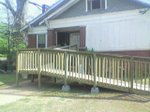Before the housing recession started most of the so-called analysts who thought there might be a downturn predicted it would be worst on the coasts, where housing prices had risen fastest.
I disagreed. I strongly believed the problem would be worst where homebuilding has been fastest. And it seems I’m right.
Every market fall goes through the five stages of grief, so this has a long way to go. (Elizabeth Kubler-Ross, who came up with the five stages of grief in 1969, died herself in 2004.)
To review, these are:
- Denial (this isn’t happening to me!)
- Anger (why is this happening to me?)
- Bargaining (I promise I’ll be a better person if…)
- Depression (I don’t care anymore)
- Acceptance (I’m ready for whatever comes)
While I have no doubt that individuals may be at any one of these
points the market as a whole is mainly in the first three stages.
- Buy a House, Get a Car
is a good example of stage one, denial. Instead of dropping your price,
you throw in extras and pretend the price hasn’t dropped at all.
- Anger is what government is facing right now. Moves to prop-up the market
are causing a backlash, as those who want lower-priced homes (which are
more affordable) see thieves lining up to get off the hook.
- Bargaining is where Wall Street is right now. Quick fixes like Countrywide’s latest loan tranche don’t deal with the underlying problem. Adding capital won’t cause lending standards to loosen.
Depression and acceptance are a long ways off. Depression will be
marked by lots-and-lots of Realtors abandoning the market. It could
even be marked by increased risk of suicides. Acceptance would feature
a capitulation to new values, homes trading on the open market (not
just the foreclosure market) at half or one-third less than they did
earlier.
This cycle of behavior is common in stock market slides. They just take
longer to play out when you’re dealing with an illiquid asset like
housing. And that’s an important fact to know. Housing is not like
stocks. It takes months to go through the paperwork needed to purchase
a home, or to sell a home. Each time you move you lose 15% or more of
your equity, in commissions and moving costs.
This will just take time to play out. Accept that, as well as a large
fall in prices, and you’re seeing the bottom. Until that happens, the
process is still going on.












